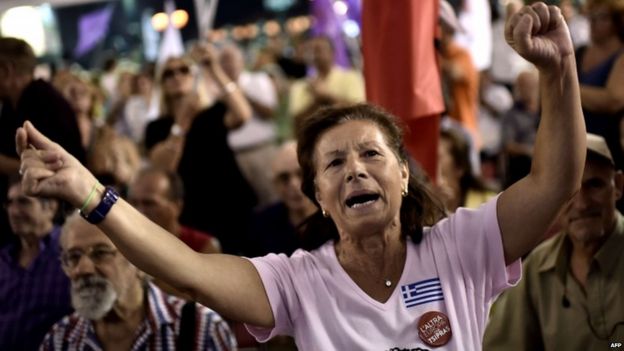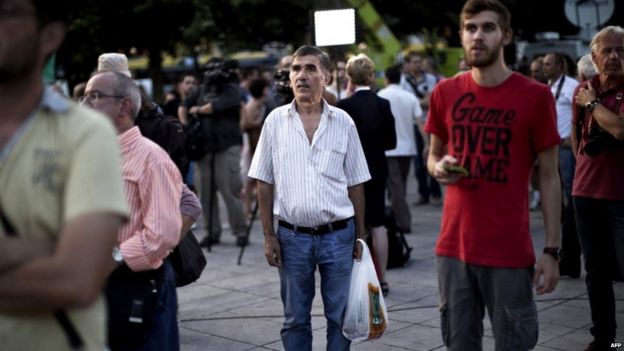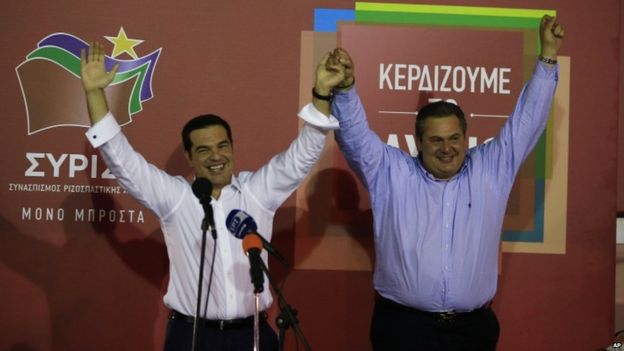Greece’s Alexis Tsipras has said his left-wing Syriza party has a “clear mandate” after winning a second general election in less than nine months.
But he said Greeks faced a difficult road and recovery from financial crisis would only come through hard work.
With nearly all votes counted, Syriza had won more than 35%.
That was short of a majority, but Syriza will form a coalition with the nationalist Independent Greeks. Conservative New Democracy won 28%.
The far-right Golden Dawn is set to be the third biggest party, with about 7% of the vote.
The snap election was called after Syriza lost its majority in August. This followed the signing of an unpopular new financial bailout deal with international creditors.
Turnout in Sunday’s poll was just over 55%, down from 63% in January and low by Greek standards.
Analysis: Paul Moss, BBC News, Athens
They expected victory, but not by this kind of margin. Only days ago, pollsters and pundits were predicting a tight-run contest, Syriza neck-and-neck with its conservative rivals, New Democracy. Instead, Syriza can comfortably form a coalition government with its previous partner, the nationalist Independent Greeks.
Critics wondered whether it was worth holding a contest which left Greece with the same government as before. But Syriza’s leader, Alexis Tsipras, is now in a stronger position, his decision to accept austerity measures in return for bailout cash apparently vindicated by the result.
Yet celebrations have been muted – hundreds not thousands gathering to sing, dance and wave flags. This country has more tough times ahead: tax rises, perhaps further cuts to wages and benefits. The re-elected prime minister has an in-box that no-one could envy.
Tsipras, the man who risked Greek future in euro
‘Difficulties ahead’
“I feel vindicated because the Greek people have a clear mandate to carry on fighting inside and outside our country to uphold the pride of our people,” Mr Tsipras told supporters in Athens.

Syriza supporters were jubilant as their party won its second election in a year

But for New Democracy supporters there was disappointment as the scale of the defeat became clear
“In Europe today, Greece and the Greek people are synonymous with resistance and dignity, and this struggle will be continued together for another four years.
“We have difficulties ahead, but we are also on firm ground. We won’t recover from the struggle by magic, but it can happen with hard work.”
Mr Tsipras was joined on stage by Panos Kammenos, leader of the the nationalist Independent Greeks, who also entered a coalition with Syriza after the previous election in January.
“Together we will continue the struggle we began seven months ago,” Mr Tsipras said.
Jeroen Dijsselbloem, who heads the Eurogroup meetings of eurozone finance ministers, said he was “ready to work closely” with the new Greek government.
“Now a solid government ready to deliver is needed quickly,” said European Parliament president Martin Schulz, offering his congratulations.

Mr Tsipras will be again sharing power with Panos Kammenos’ Independent Greeks
New Democracy leader Vangelis Meimarakis earlier admitted defeat to Mr Tsipras, saying: “I congratulate him and urge him to create the government which is needed.”
The latest projection gives Syriza 145 seats in the 300-seat parliament, with New Democracy on 75. This is only four fewer than Mr Tsipras’s thumping victory in January, but again leaves him just short of an absolute majority.
But the Independent Greeks are likely to get 10 seats.
Greece’s turbulent year
29 Dec: Greek parliament fails to elect president, leading to snap elections a month later
25 Jan: Leftist Syriza party’s Alexis Tsipras elected PM on an anti-austerity manifesto
24 Feb: Greece’s European lenders agree to extend its second bailout by four months
Jun: Marathon talks take place to avoid Greece bankruptcy and possibly leaving the eurozone. PM Tsipras calls a referendum on a possible bailout agreement
5 Jul: Greek voters overwhelmingly reject terms of third EU bailout in referendum vote
14 Aug: Greece agrees €85bn (£60bn) bailout deal with its creditors – its third in five years – allowing tax hikes and new spending cuts. Mr Tsipras resigns a week later clearing the way for snap elections in September, as he seeks a new mandate
20 Sept: New Democracy concedes election defeat to Syriza
Mr Tsipras seemed to lose popularity when signing the bailout deal, shortly after holding a referendum in which more than 60% of voters rejected the austerity measures creditors wanted to impose.
In interviews leading up to the election, Mr Tsipras said he had put his country above his party. He said that had he not agreed to the three-year bailout, Greece would probably have had to leave the eurozone.
The decision led to a split within Syriza, with rebels breaking off to form the new Popular Unity party, which advocates withdrawal from the euro. Initial results suggest the party may not win any seats in parliament.
BBC
 Q FM Africa's Modern Radio
Q FM Africa's Modern Radio